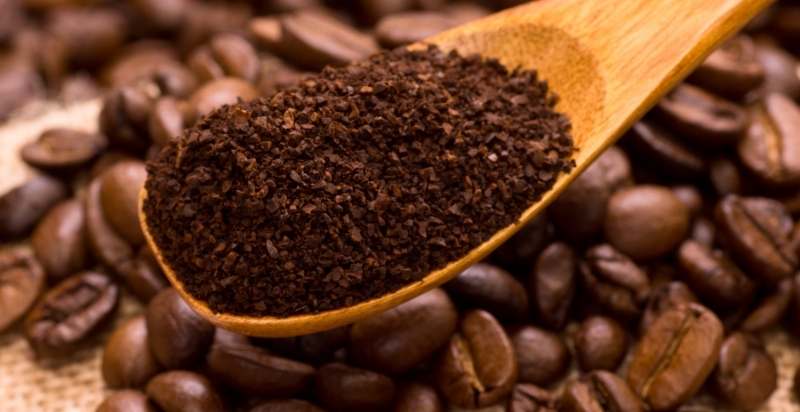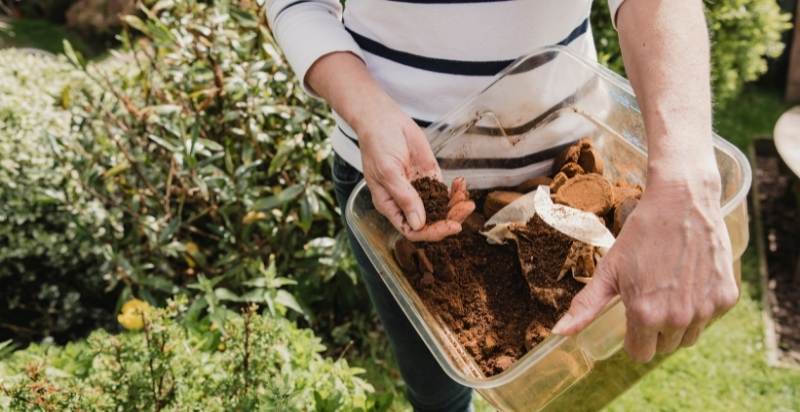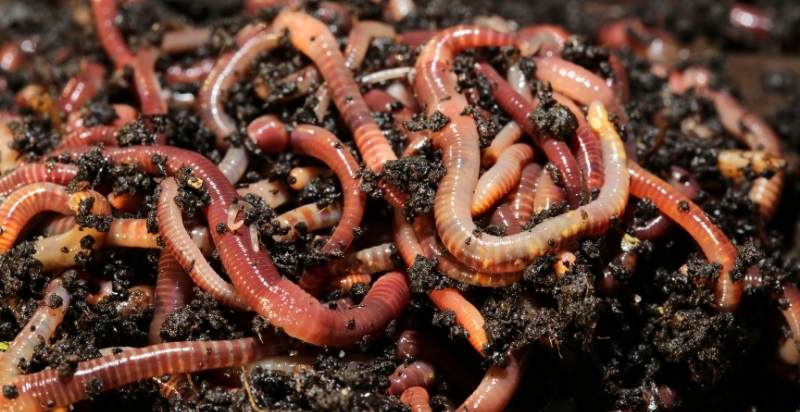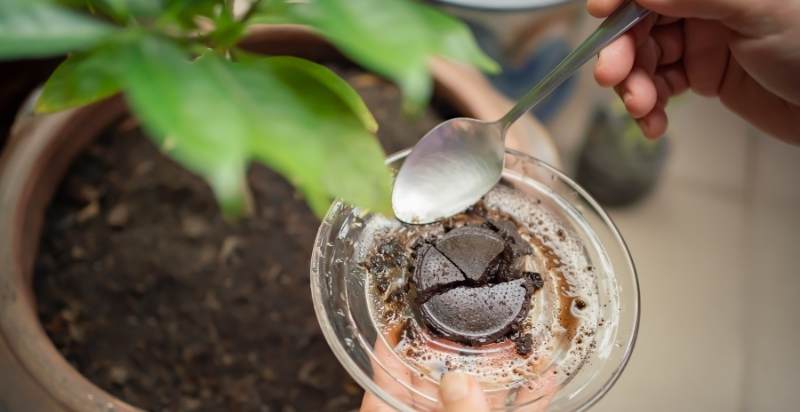Coffee grounds in the garden? Although it’s a weird idea, Coffee grounds are a fantastic, inexpensive amendment you can add to your soil to improve drainage, aeration, and nutrient content. And they’re eco-friendly, too – coffee grounds can be used as compost or mulch or simply tilled into the soil.
This guide will help you understand how to use coffee grounds in the garden and avoid any potential problems.
What Are Coffee Grounds?
As we mentioned before, coffee grounds are the leftover coffee beans that have been through the brewing process. Once the coffee beans have been roasted and ground, they’re placed in a filter and added to hot water. This mixture is then left to brew for a few minutes before enjoying the final product.
The leftover coffee grounds can be used in different ways (which we’ll get into later on), but they’re most commonly used as fertilizer or compost. Coffee grounds are rich in nitrogen, which makes them great for plants.

How To Use Coffee Grounds In The Garden?
Coffee grounds can be used in different ways in the garden. Here are some of the most popular ways to use coffee grounds:
Fertilizer: Coffee grounds are an excellent nitrogen source, which is great for plants. Add a layer of coffee grounds to your garden beds or potting mix to give your plants a boost.
Compost: Coffee grounds can be added to your compost bin to speed up the decomposition process. Just mix them with other organic matter like eggshells and vegetable scraps.
Pest control: Coffee grounds can also be used as a natural pest repellent. Sprinkle them around your garden beds to keep pests like slugs and snails at bay.

Benefits of Using Coffee Grounds in the Garden :
Coffee grounds can greatly add to your garden, providing various benefits for plants and soil. Here are some of the main benefits of using coffee grounds in the garden:
1. Coffee grounds are a good source of nitrogen.
Nitrogen is an essential nutrient for plants, and coffee grounds are a rich source of it. Nitrogen is responsible for many different things in plants, including leaf growth, which is important for healthy plant growth.
2. Coffee grounds can improve drainage.
If your soil is heavy and clay-like, adding coffee grounds can help to improve drainage. This is because coffee grounds help break up the clay particles, making it easier for water to drain.
3. Coffee grounds can help to deter pests.
Coffee grounds can be used as a natural pest deterrent in the garden. Snails and slugs don’t like crawling over them, so spreading coffee grounds around plants susceptible to these pests can help keep them at bay. Ants also don’t like coffee grounds, so if you have an ant problem in your garden, try sprinkling some coffee grounds around the affected areas.
4. Coffee grounds can attract helpful insects.
As well as deterring pests, coffee grounds can attract helpful insects to your garden. Ladybugs and earthworms are attracted to coffee grounds and can help keep your garden healthy.
5. Coffee grounds can add nutrients to the soil.
Coffee grounds contain nutrients that plants need, including nitrogen, phosphorus, potassium, and magnesium. Adding coffee grounds to the soil can help to provide these essential nutrients and improve plant growth.
6. Coffee grounds can improve the appearance of plants.
Coffee grounds can be used as a mulch around plants, helping suppress weeds and give the area a tidy appearance. They can also be used as a compost activator, helping to speed up the composting process.

Different ways To Use Coffee Grounds
Coffee grounds can be used fresh or dry, but they are most effective when composted. Composting coffee grounds break down the organic matter, making it easier for plants to use the nutrients. It also helps to reduce the risk of attracting pests or diseases to your garden.
Add coffee grounds to your compost bin or pile them along with other organic materials to compost coffee grounds. If you don’t have a compost bin, you can add them to your garden soil. Coffee grounds can also be used as mulch around plants.
Mix coffee grounds into the top few inches of soil around your plants to use them as fertilizer. You can add them to your compost bin or pile and then use the compost on your plants. It is best to avoid using too many coffee grounds, as they can be high in nitrogen and other nutrients. If you use too much, it can burn your plants.
Coffee grounds can also deter pests and animals from your garden. For example, rabbits and deer dislike the smell of coffee, so scattering coffee grounds around your garden can help keep them away. Coffee grounds can also deter slugs and snails; simply sprinkle them around your plants, and the creatures will avoid them.

Potential Problems with Using Coffee Grounds
You should be aware of a few potential problems when using coffee grounds in the garden:
- Coffee grounds can attract animals and pests if not properly used.
- Coffee grounds can add too much nitrogen to your soil if you use them too frequently or in large quantities.
- Coffee grounds can compact your soil if they are not composted first.
To avoid attracting animals and pests, it is important to compost coffee grounds before using them in the garden. You should also avoid using too much, as this can add too much nitrogen to your soil. If you use fresh coffee grounds, be sure to scatter them around so that they are not concentrated in one area.
To avoid compacting your soil, it is important to compost coffee grounds before using them as mulch or fertilizer. You can mix them into the top few inches of soil to help aerate the soil and improve drainage.
Things to Avoid When Using Coffee Grounds in the Garden
While coffee grounds can offer a range of benefits, there are also some things you should avoid doing with them. Here are some of the main things to avoid when using coffee grounds in the garden:
1. Don’t use too many coffee grounds.
While coffee grounds can benefit plants, using too many can have a negative effect. This is because coffee grounds are acidic, and adding too much acidity to the soil can damage plants. It’s important to use coffee grounds in moderation and to always test your soil before adding them.
2. Don’t use fresh coffee grounds.
Fresh coffee grounds can harm plants by releasing carbon dioxide when they decompose. If you use coffee grounds in the garden, ensure they’re old and dry first.
3. Don’t use moldy coffee grounds.
Moldy coffee grounds can harbor harmful bacteria that can damage plants. Only use clean and dry coffee grounds, and avoid using any that look moldy or have been sitting in water.
4. Avoid using too much caffeine.
While a small amount of caffeine is good for plants, too much can be harmful. This is because caffeine is a natural insecticide and can kill helpful insects like bees if used in large quantities.
5. Avoid using coffee grounds from flavored coffee.
The added flavors in flavored coffee can be harmful to plants. Stick to plain, unflavoured coffee grounds for the best results.
6. Don’t use instant coffee grounds.
Instant coffee grounds don’t offer the same benefits as fresh coffee grounds and can harm plants. This is because they often contain additives that can harm plants, so it’s best to avoid using them altogether.
7. Don’t use coffee grounds that have been treated with chemicals.
Coffee grounds treated with pesticides or other chemicals can harm plants. If you use coffee grounds in the garden, ensure they’re from organic coffee.
8. Avoid using too much sugar.
While a small amount of sugar can benefit plants, too much can damage them, and this is because sugar is also acidic and can add too much acidity to the soil if used in large quantities.
9. Avoid using coffee grounds from decaffeinated coffee.
Decaffeinated coffee grounds don’t offer the same benefits as regular coffee grounds and can harm plants. This is because decaffeinated coffee beans can remove some of the beneficial nutrients plants need.
10. Don’t use coffee grounds that have been treated with herbicides.
Herbicides can kill plants, so avoiding using coffee grounds that have been treated with them is important. If you’re not sure whether or not your coffee grounds have been treated, it’s best to err on the side of caution and avoid using them altogether.
Generally, it’s best to avoid using fresh, moldy, or flavoured coffee grounds in the garden. Stick to old, dry, and plain coffee grounds for the best results. And always test your soil before adding any coffee grounds to it.
Conclusion
Coffee grounds can be a great addition to your garden, but it is important to use them wisely. Be sure to compost them first, and avoid using too much. With a little care, you can use coffee grounds to improve the health of your plants and deter pests from your garden.
Coffee grounds can be a great way to improve your garden soil, and they add organic matter and nutrients and can help improve drainage and aeration. Coffee grounds can also be used as mulch or fertilizer, but it is important to use them wisely to avoid potential problems. With a little care, you can use coffee grounds to improve the health of your plants and deter pests from your garden.
- Everything You Wanted to Know About Red Tamarillos - June 2, 2025
- A Guide to Tulips: Everything You Need to Know & More… - June 2, 2025
- Guanabana: Description, Flavor, Benefits, And Uses - May 27, 2025
